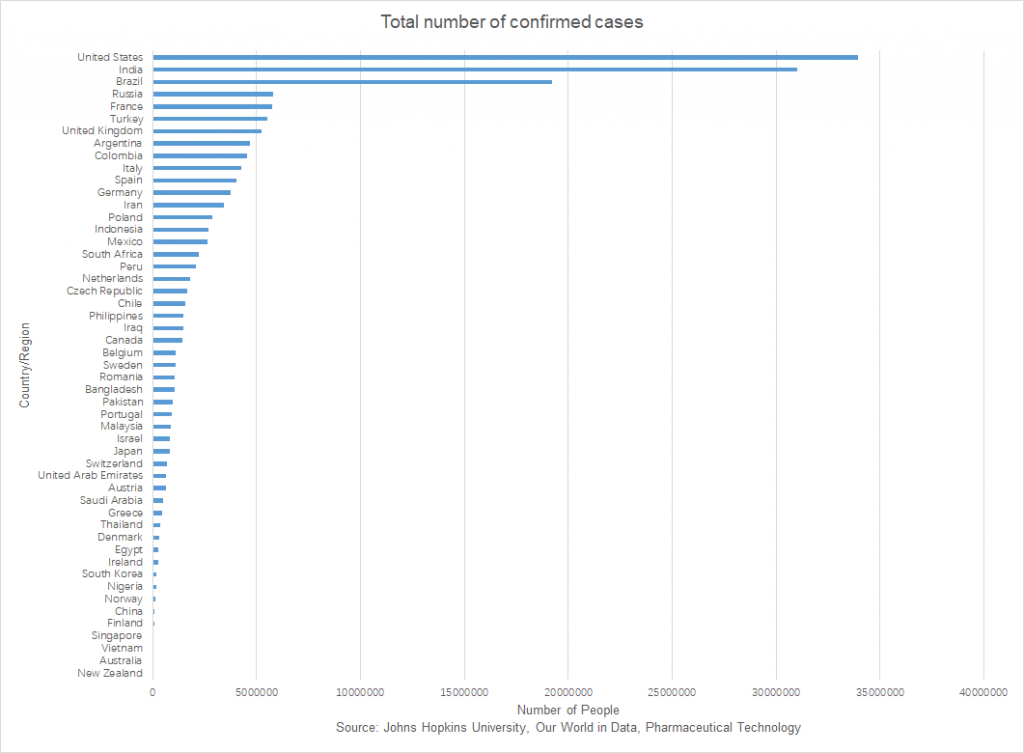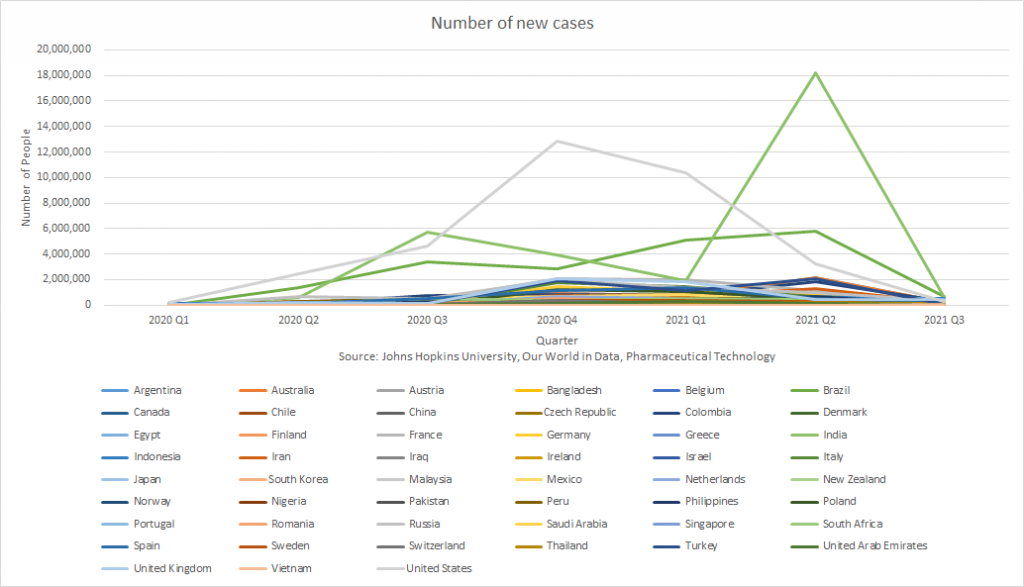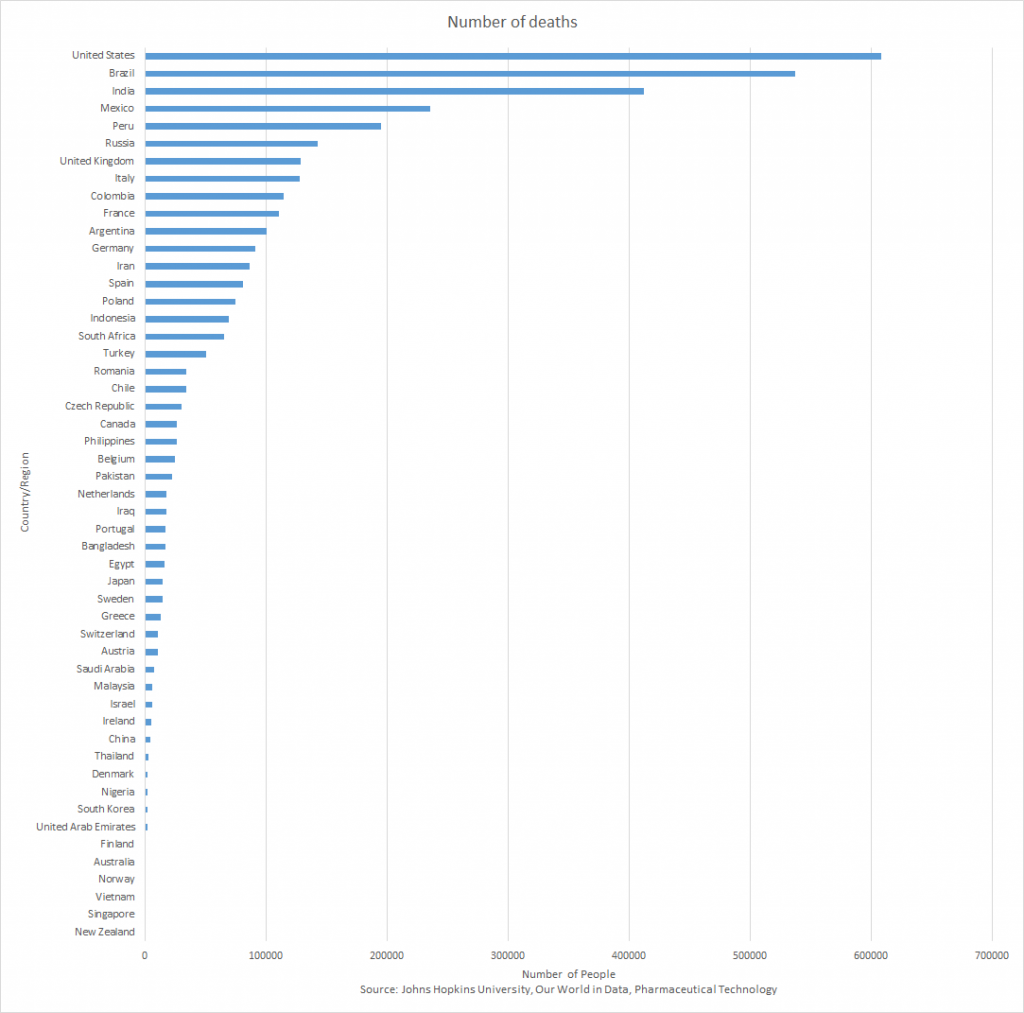Foreign news
CGTN Think Tank releases an analytical report on the global situation of the COVID-19 pandemic

As the global spread of the COVID-19 pandemic has not yet subsided, the CGTN Think Tank has released the Analytical Report on the Global Situation of the COVID-19 Pandemic (the “Report”) by sourcing data from the Johns Hopkins University website, Our World in Data and Pharmaceutical Technology that have not been comprehensively processed, analyzing research literature from the academic community and referring to the known impact of the pandemic on global economic and social development as well as the recommendations on its prevention and control from renowned public health experts.
The Report puts together the data on pandemic prevention and control measures in 51 sample countries to make rankings as a way of reflecting the current situation of pandemic control in these countries. It focuses on the importance that countries attach to personal safety, social and environmental stability, thereby providing ideas and directions for countries around the world to fight the pandemic.
The Report analyzes and evaluates the current status of pandemic prevention and control in the 51 countries based on five indicators, including the total number of confirmed cases, the number of newly confirmed cases, the total number of deaths, the number of vaccinations and the full cycle from pandemic outbreak to control as of 14 July.
The data shows that the United States has the worst performance on three of the five statistical indicators. The U.S. has over 34 million confirmed cases in total, the highest in the world, and over 600,000 deaths in total, also the highest in the world; and the number of days with less than 5,000 daily new cases in the full cycle from pandemic outbreak to control is only 62, still the worst among the sample countries.
According to the data, the situation in main European countries is not encouraging. When it comes to the total number of confirmed cases and deaths, France, the UK and Italy all rank high.
The data shows that some Asian countries have performed well in pandemic prevention and control, thanks to effective measures such as entry bans, quarantine and stringent testing at the border. China has the lowest number of confirmed new cases among the sample countries and the highest number of vaccinations in the world; Singapore and Vietnam rank low among all sample countries for the total number of COVID-19 deaths; and South Korea has adjusted the level of pandemic response in a timely manner, resulting in 537 days with less than 5,000 daily new cases.
In terms of the number of vaccinations, China is one of a few developing countries with the highest number of COVID-19 vaccinations due to its ability to develop and manufacture its own vaccines. At present, over 1.4 billion doses of COVID-19 vaccines have been administered in China. China has also supplied more than 500 million doses of COVID-19 vaccines and stock solutions to more than 100 countries and international organizations worldwide, equivalent to one-sixth of the total global vaccine production.
However, the statistics also lay bare that the vaccination progress in developing countries is significantly worse than that in developed countries, due to the severe inequality in the global distribution of vaccines. Countries with a poor vaccination record, such as Vietnam and Iraq, are still far from reaching herd immunity due to various limitations, such as poor health service and vaccine hoarding by certain developed countries.
The polarization in the number of confirmed cases, the number of deaths and the number of people vaccinated in different countries and regions of the world, as shown by the objective statistics, is very much related to national pandemic prevention and control policies and measures, and highlights the crucial role played by a country’s government in pandemic prevention and control.



Breaking News
Pakistan Observes KASHMIR SOLIDARITY DAY in Abuja

Joel Ajayi
The people of Pakistan inside the country and across the world is observing Kashmir Solidarity Day Today’s Monday express solidarity with Kashmiris in their struggle for the right to self-determination.
Since 1990, the Nation of Pakistan observes February 5th as Kashmir Solidarity Day.
According to the statement issued by the High Commissioner of Islamic Republic of Pakistan Abuja, Nigeria H.E Mr Sohail Ahmad Khan stated that, Kashmir Solidarity Day serves as an annual reminder of the prolonged conflict in Indian Illegally Occupied Jammu and Kashmir, where the struggle for self-determination has left an indelible mark on the lives of innocent Kashmiris.
“Multiple UN Resolutions unambiguously declare that the final disposition of the State of Jammu and Kashmir will be made in accordance with the will of the people expressed through the democratic method of a free and impartial plebiscite conducted under the auspices of the United Nations.
“Numerous international, UN organizations as well as UN Special Rapporteurs have reported gross human rights violations in Jammu and Kashmir.
“Media and press is under tremendous pressure by Indian Government especially in Indian Illegally Occupied Jammu and Kashmir which is evident from India’s ranking of 161 out of 180 countries as per 2023 World Press Freedom.
“Jammu and Kashmir has been converted into world’s most militarized zone and the largest prison on earth. Pakistan stands firm with Kashmiri brothers and sisters and will continue to provide unwavering diplomatic support.
“Pakistan demands that International community including United Nations and it’s relevant Human Rights Machinery, Civil Society Organizations, Media Houses and other defenders of Human Rights to fulfill their obligations towards besieged Kashmiris by playing their part to end the rule of tyranny and oppression.”
-

 Featured5 years ago
Featured5 years agoLampard Names New Chelsea Manager
-

 Featured4 years ago
Featured4 years agoFG To Extends Lockdown In FCT, Lagos Ogun states For 7days
-

 Featured5 years ago
Featured5 years agoNYSC Dismisses Report Of DG’s Plan To Islamize Benue Orientation Camp
-

 Featured4 years ago
Featured4 years agoChildren Custody: Court Adjourns Mike Ezuruonye, Wife’s Case To April 7
-

 Featured3 years ago
Featured3 years agoTransfer Saga: How Mikel Obi Refused to compensate me After I Linked Him Worth $4m Deal In Kuwait SC – Okafor
-
Sports1 year ago
TINUBU LAMBAST DELE MOMODU
-

 News8 months ago
News8 months agoJubilation In Kaduna As Tribunal Upholds Ekene Adam Winner Of Reps Election
-
Featured5 years ago
Board urges FG to establish one-stop rehabilitation centres in 6 geopolitical zones
